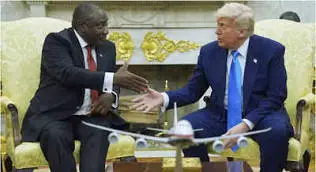In a shocking diplomatic encounter on May 21, 2025, U.S. President Donald Trump transformed a routine Oval Office meeting with South African President Cyril Ramaphosa into a contentious spectacle, screening a provocative video falsely alleging a “white genocide” in South Africa. The incident, first reported by CNN, has sparked widespread controversy, raising questions about U.S. foreign policy, racial narratives, and diplomatic etiquette during Trump’s second term. Nuzpost delves into the details of this high-stakes meeting and its implications for U.S.-South Africa relations.
A Diplomatic Meeting Turned Theatrical
The meeting began with promise as Ramaphosa, a veteran diplomat and key figure in South Africa’s post-apartheid era, arrived at the White House aiming to mend strained bilateral ties. Accompanied by prominent South Africans, including golfers Ernie Els and Retief Goosen, Agriculture Minister John Steenhuisen, and billionaire Johann Rupert, Ramaphosa sought to appeal to Trump’s personal interests. He even gifted Trump a lavish book on South African golf courses, sparking lighthearted banter about a potential golf match.
However, the mood shifted abruptly when Trump dimmed the lights and played a nearly five-minute video featuring South African opposition politician Julius Malema chanting “Kill the Boer,” a term referring to white farmers or Afrikaners. Trump presented the video as evidence of widespread persecution of white South Africans, flipping through printed articles and repeatedly exclaiming, “Death, death, death, horrible death.” The display, described by critics as an “ambush,” caught Ramaphosa’s delegation off guard, turning a diplomatic exchange into a polarizing confrontation.
Ramaphosa’s Measured Response
Despite the provocative setup, Ramaphosa remained composed, leveraging his experience as a negotiator under Nelson Mandela. He clarified that Malema’s views, as an opposition leader, do not represent South African government policy. “We have a multiparty democracy in South Africa that allows people to express themselves,” Ramaphosa stated, emphasizing his administration’s commitment to constitutional protections for all citizens. He also noted that violent crime, including murders, affects both Black and white communities, with Black South Africans facing the highest rates.
Official data supports Ramaphosa’s stance. South African police statistics for 2024 report 26,232 murders nationwide, with only 44 linked to farming communities, eight involving farmers. These figures undermine claims of a racially targeted “genocide,” as most victims are Black, and farm attacks are often opportunistic. Steenhuisen, a member of Ramaphosa’s coalition, reinforced this, highlighting efforts to counter extremist rhetoric.
Trump’s Narrative and Musk’s Role
Trump’s focus on alleged white persecution in South Africa echoes his first term, when he voiced concern for white farmers, a narrative amplified by far-right groups. His recent actions—granting refugee status to 59 white South Africans, suspending aid to South Africa, and expelling its ambassador—have further strained relations. The presence of Elon Musk, a South African-born billionaire and Trump ally, added intrigue. Musk, who has criticized South Africa’s Black empowerment policies, remained silent during the meeting, despite Pretoria’s offer to allow his Starlink service to operate as a goodwill gesture.
Global Backlash and Diplomatic Fallout
The ambush drew sharp criticism. Senator Jeanne Shaheen, a senior Democrat, condemned Trump’s tactics, stating, “The only beneficiaries of this meeting are China and Russia, who are eagerly courting South Africa as Trump’s diplomacy pushes it away.” Former U.S. ambassador Patrick Gaspard called it a “shameful spectacle,” accusing Trump of promoting “fake snuff films.” On X, users praised Ramaphosa’s calm demeanor while criticizing Trump’s approach as divisive, with some noting the strategic inclusion of white South Africans in the delegation to temper his narrative.
South African officials lauded Ramaphosa’s restraint. Land Reform Minister Mzwanele Nyhontso told the BBC, “It was uncomfortable, but the president handled it well.” Ramaphosa downplayed the drama, calling the meeting a “great success” and inviting Trump to the G20 summit in Johannesburg later in 2025. However, the incident risks alienating South Africa, a key African partner where China is the top trading partner, followed closely by the U.S.
Broader Implications
The encounter highlights the unpredictable nature of Trump’s foreign policy. Similar to his earlier confrontation with Ukrainian President Volodymyr Zelenskyy, the theatrical approach—likened by some to a “reality TV” spectacle—may deter world leaders from future White House visits. Ramaphosa’s delegation aimed to discuss trade and geopolitical issues, including South Africa’s stance on Gaza, but Trump’s focus on discredited claims overshadowed these efforts.
For U.S.-South Africa relations, the stakes are high. South Africa’s mineral wealth and strategic position make it a vital partner, yet Trump’s actions could push it closer to rivals like China. As Nuzpost reported, Ramaphosa emphasized economic opportunities, but the meeting’s fallout may complicate future cooperation.
A Polarizing Moment
he Oval Office clash has ignited debates on X and beyond, with users divided over Trump’s tactics and Ramaphosa’s response. The incident underscores the challenges of diplomacy in an era of misinformation and polarization. As Trump’s second term unfolds, such confrontations may redefine global alliances, leaving world leaders wary of the “new Hunger Games of world politics,” as CNN aptly described.
Nuzpost will continue to monitor developments in U.S.-South Africa relations. Stay tuned for updates.

